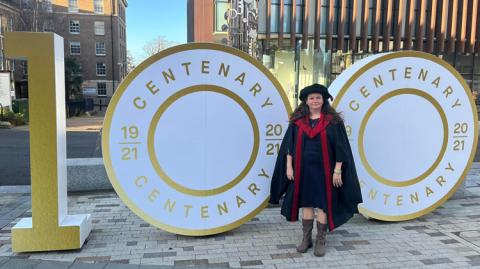Sponsored content: created in partnership with the University of Leicester.
For a more inclusive future, it may first be necessary to tell more inclusive stories of the past. Charlotte Barratt, who received her PhD from the University of Leicester in October, examined people’s experiences at a local history museum.
There was a particular focus on people representing Leicester’s superdiverse communities and their perceptions of a museum that describes the whole community’s social history.
“The museums do tend to still tell this story of migration, if they tell that story at all. And a lot of communities who have been in an area for 70, or even 100, years are still almost classed as a migrant community,” Barratt says. “When do they stop being a migrant community? And when do we start telling a much more inclusive story of our towns and cities?”
Barratt, who also studied two master’s degrees at Leicester, recorded key findings about how museums can be more inclusive. “It gave me a greater understanding of what people might be going through at different times,” she says.
Since completing her research, Barratt has started a new role at University of Leicester as student and education EDI project manager. “We advise and coach people around inclusivity on things like an inclusive curriculum and we look after the access and participation plan,” she says. “The belonging and inclusion part of my PhD is really useful for that aspect of the role.”
Given her role and own experience as a PhD researcher, Barratt can appreciate Leicester’s Future 100 PhD Scholarships scheme, announced as part of the university’s centenary celebrations.
To launch the institution into its second century, the university is making a £9 million investment in 100 PhD scholarships.
With the aim of recruiting the next generation of postgraduate researchers to change the world, the scholarships will support postgraduate researchers by covering tuition fees and providing a stipend, as well as access to a Research Training Support Grant and bench fees.
As well as nurturing the next generation of researchers, another objective of the scholarship scheme is to provide opportunities to academics from non-traditional backgrounds.
“This definitely gives a bit more flexibility on entry requirements. Rather than only looking at the grades and statistics of someone, it’s looking at their personality and realising they are the right person to do it,” Barratt says.
“A lot of the subjects being researched are inclusive subjects. This is directly showing the university will supervise areas from non-white culture and researchers will get the support and the understanding to be able to do it.”
Barratt believes the scheme can help the University of Leicester in its drive to enhance EDI across the institution.
“People look for a role model they can relate to. You want to encourage people from all backgrounds into your university, but you might not have academics from all backgrounds in your university,” she says.
“These PhDs are definitely a good stepping stone to get people into positions where they can feel like they’re going to be supported and might be stepping up into those academic roles to become role models for the next student.”
Find out more about postgraduate research at the University of Leicester.

Comments